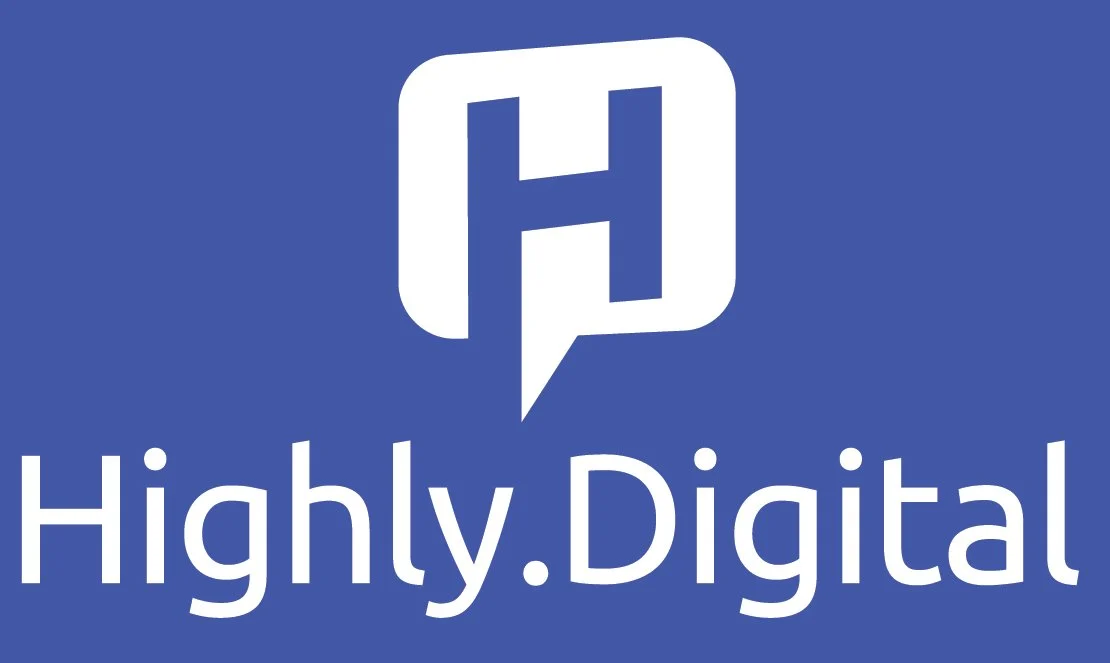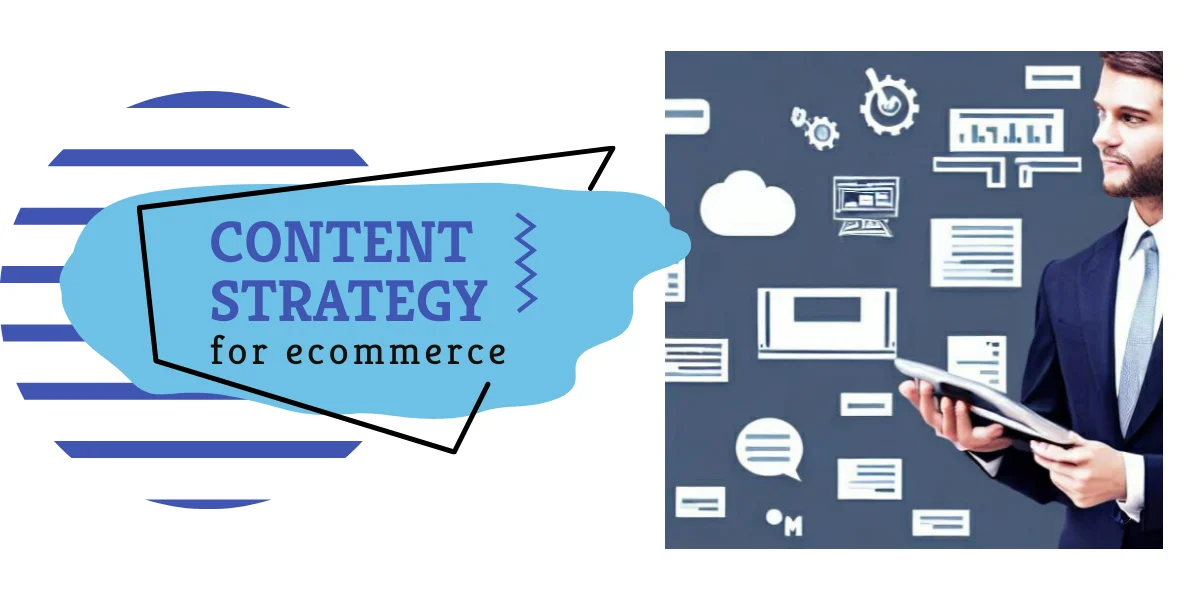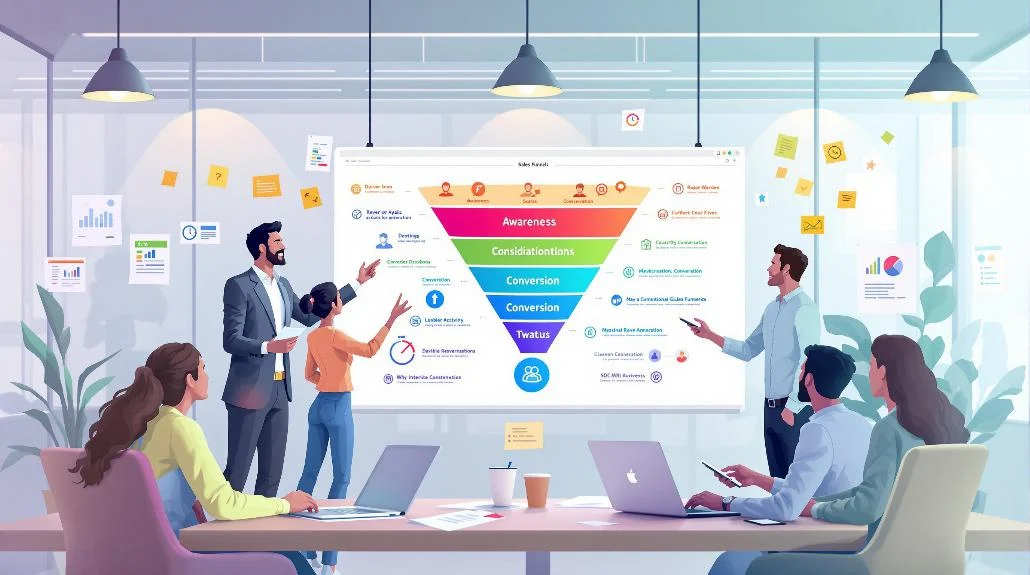A Digital Content Strategist is essential for any brand's online success. They align content with business goals while engaging audiences through storytelling.
Crafting audience personas helps tailor strategies effectively. They manage editorial calendars, ensuring timely content that resonates with consumers.
Regular content audits refine strategies based on performance metrics, making content more impactful. Furthermore, they collaborate with writers, designers, and marketers to produce high-quality output.
Continuous learning keeps them adaptable in a fast-evolving online environment. Intrigued? There's much more to explore about how they drive success in today's digital marketing landscape.
Key Takeaways
- Develops and executes content strategies that align with business goals to enhance digital marketing effectiveness.
- Conducts audience analysis to create tailored content that meets consumer needs and preferences.
- Manages an editorial calendar to organise content production and ensure timely launches.
- Collaborates with writers, designers, and marketers to produce high-quality, engaging content.
- Analyses performance metrics to assess content impact and refine strategies for improved engagement.
Overview of Content Strategy
Content strategy serves as the foundation for effective digital marketing, aligning content creation with business objectives to drive sales, engagement, and brand loyalty.
It's not just about posting articles or videos; it's about understanding your brand's mission and values. What are you trying to communicate?
Effective content marketing focuses on your target audience. Who are they? What do they care about? By crafting compelling brand storytelling, you can create relevant content that resonates deeply with consumers.
Regular content management is essential. An editorial calendar keeps you organised and aligned with your goals.
Plus, evaluating your content through metrics ensures it remains impactful. Are your efforts attracting and retaining customers?
Role of a Digital Content Strategist
The role of a Digital Content Strategist is pivotal in guiding content production and audience engagement strategies.
Imagine crafting messages that not only capture attention but also build lasting connections with your audience.
Content Production Oversight
How does effective oversight of content production influence a brand's online presence? It plays a significant role in shaping how audiences perceive a brand.
A Digital Content Strategist ensures that content quality meets high standards by developing and enforcing clear production plans.
Collaboration with writers and editors leads to diverse and engaging materials tailored for audience targeting.
By conducting regular content audits, strategists evaluate what resonates with consumers and align it with business objectives.
Keeping track of project calendars helps maintain deadlines, guaranteeing timely launches that keep the brand relevant.
Ultimately, this oversight not only enhances the quality of content but also strengthens the brand's connection with its audience, fostering loyalty and engagement in a competitive online environment.
Audience Engagement Strategies
Effective audience engagement strategies are vital for a brand's success in the online environment. Digital Content Strategists utilise audience profiles to create tailored content that resonates deeply with target demographics. This personalisation fosters loyalty and enhances engagement rates.
Interactive content is a powerful tool. Think polls, quizzes, and videos that invite participation. Such elements not only entertain but also gather valuable audience feedback.
Social media campaigns play a significant role here, as 79% of consumers prefer brands that actively engage with them. Monitoring key performance indicators helps strategists refine their approach.
Regular market research reveals trends and behaviours, enabling timely adaptations. By combining SEO practices with engaging content, brands guarantee discoverability and relevance.
How are you engaging your audience today?
Key Responsibilities
A Digital Content Strategist plays a pivotal role in shaping and executing content strategies that align with overarching business goals. They explore content trends, identifying what resonates with audiences.
By developing detailed audience personas, they tailor content that meets the specific needs of target demographics. These strategists conduct market research to uncover content gaps, ensuring every piece produced is relevant and engaging.
Regular analysis of key performance indicators (KPIs) allows them to gauge success. Are your strategies hitting the mark?
Collaboration is essential. They work closely with designers and marketers to produce high-quality content. Furthermore, implementing SEO best practices enhances visibility.
The ultimate goal? Drive organic traffic and foster meaningful connections with audiences across digital platforms.
Content Creation and Planning
In the realm of content creation and planning, effective strategies are essential for success.
How do you ensure your content resonates with your audience? By employing content ideation techniques, managing an editorial calendar, and analysing your audience, a Digital Content Strategist can craft compelling narratives that capture attention and drive engagement.
Content Ideation Techniques
Content ideation techniques are essential for developing creative and relevant content that resonates with target audiences while meeting business objectives.
One effective approach involves brainstorming techniques, where teams collaborate to generate innovative ideas.
Utilising audience personas is fundamental. These personas help strategists tailor content to specific demographics, interests, and behaviours, ensuring engagement from the right people.
Mind mapping can visualise themes, while analysing current content trends reveals opportunities for new topics.
Have you ever considered how feedback mechanisms, like surveys, can refine your ideas?
These methods create a vibrant content pipeline.
By blending creativity with structured planning, content strategists can consistently deliver material that captivates and connects.
Adopt these techniques, and watch your content soar!
Editorial Calendar Management
An editorial calendar serves as an essential framework for digital content strategists, enabling them to systematically plan, schedule, and organise content across multiple platforms.
It enhances content effectiveness through careful coordination.
Consider these key elements of effective editorial calendar management:
- Seasonal Planning: Align content with holidays and events to optimise engagement.
- Editorial Flexibility: Regularly update the calendar to adapt to trends and analytics.
- Accountability: Assign deadlines and responsible team members to streamline the process.
- Communication Tool: Ensure all team members are aligned on content goals and timelines.
Audience Analysis Methods
Effective content strategies rely heavily on a deep understanding of the target audience.
To achieve this, digital content strategists employ audience analysis methods that include surveys, interviews, and market research.
These techniques help identify customer preferences and behaviours.
Audience segmentation strategies are essential here, allowing marketers to categorise their audience into specific groups based on demographics, psychographics, and online behaviour.
Have you ever wondered how your favourite brands seem to know you so well?
They likely use demographic profiling techniques to create detailed audience personas.
Furthermore, tools like Google Analytics reveal trends and engagement patterns.
Regular content audits and feedback analysis ensure that strategies remain relevant.
Audience Analysis
Understanding the audience is paramount for any digital content strategist aiming to create impactful messaging. To achieve this, consider the following key strategies:
- Identify target demographics: Who are your audiences? Age, gender, and location matter.
- Gather qualitative insights: Use surveys and interviews to uncover customer needs.
- Analyse engagement metrics: What content resonates most? Analytics reveal user preferences.
- Segment your audience: Tailor content based on interests to improve relevance and connection.
Regularly updating your audience analysis is essential. Consumer trends shift, and staying aligned fosters brand loyalty.
After all, the more you know your audience, the better you can engage them. Are your strategies keeping pace with their evolving preferences? The answer lies in a robust audience analysis.
SEO Strategy Development
A well-structured SEO strategy is essential for enhancing a brand's online visibility and attracting targeted audiences.
To begin with, conducting thorough keyword research is vital. This helps identify the terms your potential customers are actively searching for.
Next, implement effective keyword optimisation techniques. This includes using meta tags, headings, and internal linking to improve your content's search engine ranking.
But it doesn't stop there! Regular content audits help you assess existing content for SEO performance. Are there gaps? Opportunities for improvement?
Finally, don't underestimate the power of backlink acquisition strategies. Acquiring high-quality inbound links from reputable sites can greatly improve your domain authority.
With these strategies in place, your website can rise in search rankings, attracting the right visitors.
Content Distribution Channels
Content distribution channels play an essential role in amplifying a brand's message and connecting with target audiences. To enhance reach, consider these key strategies:
- Social Media: Engage your audience where they spend their time. Platforms like Instagram and Twitter can increase interaction.
- Email Marketing: Directly reach consumers with personalised messages. This nurtures relationships and drives conversions.
- Content Syndication: Share your content across multiple platforms. This expands visibility and attracts diverse audiences.
- Influencer Partnerships: Collaborate with influencers to harness their reach. Their endorsement can raise brand credibility.
Effective audience segmentation guarantees that your content reaches the right people through the right channels.
Performance Metrics and Analysis
As online environments evolve, measuring the effectiveness of content strategies becomes increasingly essential for achieving business objectives. Performance metrics such as website traffic and engagement rates help strategists gauge success.
But how do you turn numbers into action?
Regular content audits allow for ongoing assessment against business goals. This leads to content optimisation, ensuring your materials resonate with your audience. Tools like Google Analytics reveal user behaviour, helping you make informed decisions.
A/B testing different content versions can highlight what truly engages users. Are you receiving feedback from your audience? That's critical.
Continuous monitoring and adapting to user feedback can refine your strategy. In the end, understanding these metrics is not just about numbers; it's about connecting with your audience and driving real results.
Collaboration With Teams
Collaboration is at the heart of a Digital Content Strategist's role.
Consider this: how can a single voice resonate without the harmony of writers, designers, and marketers working together?
Cross-Departmental Communication
Effective cross-departmental communication is essential for digital content strategists to create unified messaging and branding across multiple channels.
By fostering team collaboration, strategists ensure messaging consistency that resonates with audiences.
Here are key ways to enhance cross-departmental communication:
- Regular Meetings: Schedule brainstorming sessions with marketing, design, and product teams to align on objectives.
- UX Team Engagement: Collaborate closely with the UX team to tailor content that meets user needs.
- Feedback Loops: Gather insights from senior stakeholders to refine strategies and improve effectiveness.
- Project Management Tools: Employ these tools to track progress and maintain transparency among departments.
With these practices, digital content strategists can create a cohesive narrative that enhances brand identity and drives engagement.
Project Management Coordination
To ensure that digital content meets marketing objectives and deadlines, project management coordination is essential for digital content strategists. They work closely with editors, writers, and designers to confirm team alignment.
Effective project scheduling is vital. By maintaining project calendars, strategists track milestones and deadlines, ensuring timely delivery across platforms. Imagine a well-oiled machine where everyone knows their role and timing.
Regular meetings are another key aspect. These sessions allow teams to review progress and tackle challenges together. When all members communicate effectively, it enhances collective project efficiency.
Utilising project management tools can further streamline workflows. These tools foster collaboration and clarity among team members.
In the end, this coordination ensures that every piece of content resonates with the target audience and remains true to the brand's voice.
Creative Idea Generation
In the dynamic landscape of digital content strategy, creative idea generation thrives on the synergy of cross-functional teams. Collaboration is key. By combining diverse perspectives, teams can develop groundbreaking content that truly resonates.
Here are four effective strategies to enhance this collaboration:
- Regular brainstorming sessions: Employ brainstorming techniques to encourage free-flowing ideas.
- Creative workshops: Organise workshops that foster teamwork and creativity.
- Insights sharing: Schedule meetings to share research findings and audience profiles.
- Data-driven discussions: Capitalise on analytical tools to guide conversations with data insights.
These practices guarantee that all stakeholders contribute, leading to content that aligns with business goals and meets customer needs.
Budget Management
A digital content strategist's budget management responsibilities are fundamental for ensuring that content initiatives align with organisational goals while delivering measurable results.
Budget forecasting plays an essential role here. By predicting future needs based on past performance, strategists can allocate resources wisely.
Have you ever wondered how projects are prioritised? Expense analysis is key. It helps assess the cost-effectiveness of content initiatives, ensuring that every pound spent contributes to a greater purpose.
Moreover, collaboration with financial teams is critical. This partnership guarantees compliance with budgetary constraints while optimising spending, ultimately enhancing content quality and engagement.
Effective budget management isn't just about numbers; it's about making strategic decisions that drive impact.
Are you ready to see how a well-managed budget can transform your content strategy?
Continuous Learning and Adaptation
Continuous learning is essential for digital content strategists navigating an ever-changing landscape marked by new trends and technologies.
To thrive, strategists must prioritise professional development by engaging with the following:
- Advanced Courses: Enrol in SEO and content marketing programmes to enhance your skills.
- Industry Events: Attend webinars and conferences to network and learn from peers.
- Online Resources: Utilise free masterclasses and courses to quickly refine specific skills.
- Stay Updated: Regularly research emerging technologies to remain competitive.
As digital marketing is projected to reach £786.2 billion by 2026, the demand for knowledgeable content strategists is growing.
Are you ready to adapt and seize the opportunities that come your way?
Essential Skills Required
To excel as a digital content strategist, possessing a diverse skill set is essential. Strong writing and editing skills enable you to craft engaging content that reflects your brand voice. Proficiency in SEO practices is critical for optimising visibility and driving organic traffic. Familiarity with content management systems (CMS) helps streamline organisation and publishing.
Analytical skills are fundamental for interpreting data, guiding necessary adjustments in your strategy. Furthermore, excellent communication and collaboration abilities foster teamwork across cross-functional areas.
Here's a quick overview of essential skills:
| Skill | Importance | Example Application |
|---|---|---|
| Writing & Editing | Creates engaging content | Blog posts, social media updates |
| SEO | Enhances search engine visibility | Keyword optimisation |
| CMS Familiarity | Organises and tracks content | WordPress, HubSpot |
| Analytical Skills | Adjusts strategies based on data insights | Performance metrics analysis |
| Communication | Aligns team goals with branding strategies | Cross-department meetings |
Embrace these skills to master digital storytelling and connect with your audience.
Tools and Resources
In the ever-evolving landscape of digital marketing, the right tools and resources are essential for success.
For instance, content management systems like WordPress streamline the process of organising and publishing content.
What about analytics tools, you ask? They not only track performance but also guide your strategy, helping you make informed decisions that can enhance your brand.
Essential Digital Marketing Tools
A diverse array of essential online marketing tools empowers content strategists to optimise their efforts and enhance overall campaign effectiveness.
These tools facilitate critical tasks that drive success in today's fast-paced online environment.
- SEO Tools: Employ platforms like SEMrush and Ahrefs for keyword optimisation and competitor analysis.
- Social Media Management: Tools such as Hootsuite and Buffer provide invaluable social media analytics to monitor engagement.
- Email Marketing Platforms: Utilise Mailchimp for email segmentation and content personalisation that resonates with your audience.
- Analytics Software: Google Analytics is essential for performance benchmarking and understanding online trends.
These tools not only streamline marketing automation but also empower strategists to make informed, data-driven decisions.
Ready to boost your online strategy? The right tools await!
Content Management Systems
Selecting the right Content Management System (CMS) can greatly enhance a digital content strategist's ability to streamline workflows and improve content delivery across multiple platforms.
A well-chosen CMS not only supports CMS integration but also allows for user permissions, guaranteeing team collaboration without chaos.
Consider content templates and workflow automation to speed up your processes. What about plugin management? It can considerably extend your CMS's capabilities.
Mobile optimisation is essential in today's world, as is data migration when upgrading systems.
Customisation options can tailor the CMS to your needs, while robust security features protect your assets.
Analytics and Performance Tracking
Understanding audience interaction with content is fundamental for digital content strategists, and analytics plays a key role in this process. By employing diverse tools, strategists can gain invaluable insights into user behaviour.
Here are four essential resources:
- Google Analytics – Offers data visualisation to track engagement rates and web traffic.
- SEMrush – Helps in audience segmentation by revealing how different demographics interact with content.
- Hootsuite – Provides social media analytics to gauge sentiment and engagement.
- A/B Testing Tools – Allow for experimentation with content variations to see what resonates best.
Regularly auditing content using these tools helps identify strengths and areas for improvement. This data-driven approach fosters informed decisions, ensuring content strategies evolve effectively.
Isn't it exciting to transform data into actionable insights?
Career Path and Opportunities
How can aspiring digital content strategists navigate their career paths effectively?
Initially, start by gaining experience in related roles such as digital content creation or SEO. Many strategists begin in marketing positions and work their way up.
With approximately 4,284 open positions in the UK, the job market is promising.
Continuous learning is essential. Consider enrolling in online courses or obtaining certifications to remain competitive. This knowledge will give you an advantage in career advancement.
Networking is also important. Attend industry webinars and events to connect with professionals and mentors.
These relationships can open doors and provide valuable guidance.
Frequently Asked Questions
What Is a Digital Content Strategist?
A digital content strategist is a professional who develops and implements content marketing strategies aimed at enhancing audience engagement. They analyse market trends and consumer behaviour to create effective content tailored to target demographics across digital platforms.
What Is the Role of a Digital Strategist?
The role of a digital strategist involves leveraging digital trends and audience targeting to develop effective marketing campaigns. They analyse data to optimise engagement strategies, ensuring alignment with business goals and enhancing the overall customer experience.
What Is the Role of a Digital Content Specialist?
A Digital Content Specialist focuses on content creation and audience analysis, ensuring material resonates with target demographics. This role encompasses optimising content for search engines and analysing performance metrics to enhance engagement and drive conversions effectively.
What Does a Digital Account Strategist Do?
A Digital Account Strategist focuses on developing content marketing strategies that enhance audience engagement. By analysing trends and consumer behaviour, they create tailored campaigns, integrating diverse digital channels to optimise performance and achieve client objectives.
Conclusion
In summary, the role of a digital content strategist is crucial in today's online environment. Responsibilities span from content creation to audience analysis and continuous adaptation. A successful strategist combines essential skills, creativity, and analytical thinking. The path in this field offers numerous opportunities for growth and innovation. Embracing these challenges can lead to impactful storytelling and meaningful engagement. Ultimately, a strong content strategy can transform a brand's voice and connect deeply with its audience.



